英语专四重点整理
专四常考语法点汇总

语法与词汇专项语法核心考点一:从属分句复合句 = 主句 +从句( 1 个或 1 个以上)要点 1 从属分句是复合句必不可少的组成部分,以语法功能作为分类标准,从属分句可以分为状语从句、关系从句(即定语从句)和名词性从句。
其中状语从句可分为时间、地点、原因、结果、程度、目的、条件、让步和方式等;名词性从句可分为主语从句、宾语从句、表语从句、同位语从句。
要点 2 状语从句的考点集中在方式、条件、让步、方式和时间状语从句上;关系从句的考点集中在关系代词的选择,限制性定语从句和非限制性定语从句的区别;名词性从句的考点集中在宾语从句和同位语从句。
一状语从句状语从句真题剖析:1Nine is to three _____ three is to one. (2008, 53)A. whenB. thatC. whichD. what2______ he wanted to go out with his friends at the weekend, he had to stay behind to finish his assignment. (2008, 55)A. Much thoughB. Much asC. As muchD. Thouth much3Men differ from animals ____ they can think and speak. (2008, 54)A. for whichB. for thatC. in thatD. in which4They stood chatting together as easily and naturally as ____. (2008, 60)A. it could beB. could beC. it wasD. was5The couple had no sooner got to the station ______ the coach left. (2009,60)A. whenB. asC. untilD. than6____ the boss says, it is unreasonableto ask me to work overtime without pay.(2010, 55)A. WhateverB. WheneverC. WhicheverD. However 7 Fool____ Jerry is, he could not have done such a thing. A. who B. asC. likeD. that8 He asked me to lend him some money, which I agreed to do, ___ that he paid me back the following week. (2005)A. on occasionB. on purposeC. on conditionD. only if 9 Which ofthe following contains an adverbial clause of cause? A. I got a jobas soon as I left university.B. As there was on answer, I wrote again.C. You must do the exercise as I show you.D. Wealthy as he is, Mark is not a happy man.状语从句重点总结:(一)条件状语从句:表示条件或假设,通常由以下连词或结构引导:If 如果unless如果不;除非as long as 只要so long as 只要on condition that 条件是in the event that 如果,在⋯⋯的情况下provided/providing that 假如given that 如果suppose/supposing that假如assuming (that ) 假如say 假如★特别提醒几种不常用的条件状语从句举例:In the event that she can not arrive on time, we will go first.Suppose it snowed, we would still go.Say what he said were true, what would you do about it?(二)让步状语从句:含有“虽然,尽管,即使”之意,主要引导词有:though/although 虽然even if/even though 即使no matter + 疑问词无论疑问词 +ever 无论in spite of the fact that 尽管while 尽管much as 不管⋯⋯尽管⋯⋯for all that 尽管as/though granted/granting (that ) 虽然,尽管★特别提醒1.几种不常用的让步状语从句举例:In spite of the fact that he was deaf and dumb, he had a genius for music.While the grandparents love the children, they are strict with them.Much as she needed the job, she had to refuse.For all that there were a lot of difficulties, he finally entered the final competition and won.Granted you have made much progress, you should not be conceited.2. 用了 although 或 though,就一定不能再后面的从句中同时用but,但是 though 可以和 yet 连用。
专四考试知识点总结

专四考试知识点总结第一部分:听力1. 听力原文:考生需仔细听取材自真实场景和真实语境的对话和短文,理解对话和短文的主题,目的,情感色彩,共19-22题。
与细节题、概括题、态度判断题等。
2. 听力复述:考生需要以自己的话复述所听内容。
共1题。
3. 听力理解:可分为“情境性对话”(Shopping,At the Airport等)、科技文化(科技、文化类等)等类别。
主要考察考生理解对话、文章的主题、目的和信息,与听力原文部分有部分重合题目,共11-12题。
第二部分:阅读1. 选词填空:考生要注意小题前后的句子,依据小题后的提示词从选项中将插入选项的单词寻找到原文中,构成句子。
2. 阅读判断:考生需判断给出的句子与文章内容是否符合。
3. 阅读选择:细阅读文章内容,再做出选择。
4. 阅读表达:由一篇短语作文,要求考生根据提纲及选文自由发挥作答。
第三部分:翻译1. 英译汉:译文大意通顺,要求准确、流畅。
2. 汉译英:进行准确忠实的翻译。
第四部分:写作1. 日常生活类:旅行、婚礼、健康、饮食等。
2. 文化教育类:传统节日、亲子关系、文化遗产等。
3. 社会时政类:社会问题,政治热点等。
4. 书信类:邀请信,建议信,辞职信,感谢信等。
第五部分:口语1. 自我介绍2. 话题自述:针对一个话题进行自由发挥。
3. 对话环节:模拟对话、也可有语音分析等。
第六部分:词汇1. 词义辨析:同义词、反义词、搭配辨析。
2. 词句填空:从词典里选出与所给词汇意思接近的词语。
3. 词组短语:日常用语,俗语、成语等。
第七部分:语法1. 单项选择:涉及时态、语态、比较级、被动语态、虚拟语气等。
2. 完形填空:阅读材料,全文通读,把握上下文,找出符合语境的内容。
3. 翻译:中译英、英译汉。
第八部分:写作1. 作文(一):看图作文;短文写作。
2. 作文(二):开放性作文;看图作文。
3. 作文(三):开放性作文。
以上就是专四考试的知识点总结,考生可结合这些知识点进行备考,相信你一定会取得优异的成绩。
专四常考语法点汇总定稿版

专四常考语法点汇总精编W O R D版IBM system office room 【A0816H-A0912AAAHH-GX8Q8-GNTHHJ8】语法与词汇专项语法核心考点一:从属分句复合句= 主句+从句(1个或1个以上)要点1从属分句是复合句必不可少的组成部分,以语法功能作为分类标准,从属分句可以分为状语从句、关系从句(即定语从句)和名词性从句。
其中状语从句可分为时间、地点、原因、结果、程度、目的、条件、让步和方式等;名词性从句可分为主语从句、宾语从句、表语从句、同位语从句。
要点2 状语从句的考点集中在方式、条件、让步、方式和时间状语从句上;关系从句的考点集中在关系代词的选择,限制性定语从句和非限制性定语从句的区别;名词性从句的考点集中在宾语从句和同位语从句。
一状语从句状语从句真题剖析:1 Nine is to three _____ three is to one. (2008, 53)A. whenB. thatC. whichD. what2 ______ he wanted to go out with his friends at the weekend, he had to stay behind to finish his assignment. (2008, 55)A. Much thoughB. Much asC. As muchD. Thouth much3 Men differ from animals ____ they can think and speak. (2008, 54)A. for whichB. for thatC. in thatD. in which4 They stood chatting together as easily and naturally as ____. (2008, 60)A. it could beB. could beC. it wasD. was5 The couple had no sooner got to the station ______ the coach left. (2009,60)A. whenB. asC. untilD. than6 ____ the boss says, it is unreasonable to ask me to work overtime without pay. (2010,55)A. WhateverB. WheneverC. WhicheverD. However7 Fool ____ Jerry is, he could not have done such a thing.A. whoB. asC. likeD. that8 He asked me to lend him some money, which I agreed to do, ___ that he paid me back the following week. (2005)A. on occasionB. on purposeC. on conditionD. only if9 Which of the following contains an adverbial clause of cause?A. I got a job as soon as I left university.B. As there was on answer, I wrote again.C. You must do the exercise as I show you.D. Wealthy as he is, Mark is not a happy man.状语从句重点总结:(一)条件状语从句:表示条件或假设,通常由以下连词或结构引导:★特别提醒几种不常用的条件状语从句举例:In the event that she can not arrive on time, we will go first. Suppose it snowed, we would still go.Say what he said were true, what would you do about it?(二)让步状语从句:含有“虽然,尽管,即使”之意,主要引导词有:★特别提醒1. 几种不常用的让步状语从句举例:In spite of the fact that he was deaf and dumb, he had a genius for music. While the grandparents love the children, they are strict with them.Much as she needed the job, she had to refuse.For all that there were a lot of difficulties, he finally entered the final competition and won.Granted you have made much progress, you should not be conceited.2. 用了although或though,就一定不能再后面的从句中同时用but,但是though可以和yet 连用。
英语专业四级核心词汇(整理版)
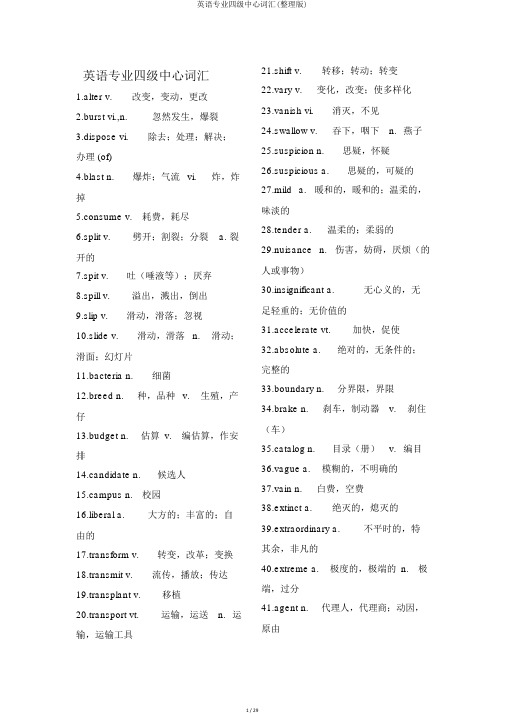
英语专业四级中心词汇1.alter v.改变,变动,更改2.burst vi.,n.忽然发生,爆裂3.dispose vi.除去;处理;解决;办理 (of)4.blast n.爆炸;气流vi.炸,炸掉5.consume v.耗费,耗尽6.split v.劈开;割裂;分裂 a. 裂开的7.spit v.吐(唾液等);厌弃8.spill v.溢出,溅出,倒出9.slip v.滑动,滑落;忽视10.slide v.滑动,滑落n.滑动;滑面;幻灯片11.bacteria n.细菌12.breed n.种,品种v.生殖,产仔13.budget n.估算v.编估算,作安排14.candidate n.候选人15.campus n.校园16.liberal a.大方的;丰富的;自由的17.transform v.转变,改革;变换18.transmit v.流传,播放;传达19.transplant v.移植20.transport vt.运输,运送n.运输,运输工具21.shift v.转移;转动;转变22.vary v.变化,改变;使多样化23.vanish vi.消灭,不见24.swallow v.吞下,咽下n.燕子25.suspicion n.思疑,怀疑26.suspicious a.思疑的,可疑的d a.暖和的,暖和的;温柔的,味淡的28.tender a.温柔的;柔弱的29.nuisance n.伤害,妨碍,厌烦(的人或事物)30.insignificant a.无心义的,无足轻重的;无价值的31.accelerate vt.加快,促使32.absolute a.绝对的,无条件的;完整的33.boundary n.分界限,界限34.brake n.刹车,制动器v.刹住(车)35.catalog n.目录(册)v.编目36.vague a.模糊的,不明确的37.vain n.白费,空费38.extinct a.绝灭的,熄灭的39.extraordinary a.不平时的,特其余,非凡的40.extreme a.极度的,极端的n.极端,过分41.agent n.代理人,代理商;动因,原由42.alcohol n. 含酒精的饮料,酒精68. vessel n. 船舶;容器,器皿;43.appeal n./vi. 号召,央求血管44.appreciate vt. 重视,欣赏,欣69. vertical a. 垂直的赏70. oblige v. 迫使,责成;使感谢45.approve v. 同意,赞成,赞成71. obscure a. 灰暗,模糊46.stimulate vt. 刺激,激励72. extent n. 程度,范围,大小,47.acquire vt. 获得,获取;学到限度48.accomplish vt . 达成,到达;实73. exterior n. 外面,表面 a. 外行部的,表面的work n. 网状物;广播网,电74. external a. 外面的,表面的,视网;网络外面的50.tide n. 潮汐;潮流75. petrol n. 汽油51.tidy a. 整齐的,齐整的76. petroleum n. 石油52.trace vt. 追踪,找到 n. 印迹,77. delay vt./n. 推延,延迟,耽误踪影78. decay vi. 腐化,腐败53.torture n./vt. 拷打,摧残79. decent a. 像样的,风光的54.wander vi. 遨游,闲逛80. route n. 路;路线;航线55.wax n. 蜡81. ruin v. 破坏,破坏 n. 破坏,56.weave v. 织,编[pl.] 废墟57.preserve v. 保护,保留,保持,82. sake n. 缘由,原由保持83. satellite n. 卫星61. abuse v. 滥用,凌虐;诅咒84. scale n. 大小,规模;等级;刻62. academic a. 学术的;高等院校85. temple n. 庙宇的;研究院的86. tedious a. 乏滋味,单一的,64. battery n. 电池(组)87. tend vi. 易于,趋势65. barrier n. 阻碍;棚栏88. tendency n. 趋势,趋势66. cargo n. (船、飞机等装载的)89. ultimate a. 极端的,最大的,货物最后的 n. 极端67. career n. 生涯,职业90. undergo v. 经历,遭到91. abundant a. 丰富的,丰裕的,catch fire 着火,烧着大批的catch one's breath喘息,松口92. adopt v. 收养;采用;采用气; 屏息93. adapt vi. 适应,适合;改编,catch one's eye 惹人注视改写 vt. 使适应catch sight of 看到, 发现94. bachelor n. 学士,学士学位;come into effect 奏效;实行只身一人汉come into operation 实行, 推行 , 95. casual a. 有时的,刚巧的;临奏效时的;非正式的come to one's senses 觉悟;苏96. trap n. 圈套,骗局 v. 设圈套醒捕获come true 实现97. vacant a. 空的,未占用的could not help 忍不住 , 不由得98. vacuum n. 真空,真空吸尘器cut short 中止, 打断99. oral a. 口头的,口述的,口的do one's best 全力,努力100. optics n. (单、复数同形)光enjoy oneself 过得快活学fall in love with 爱上find fault(with) 找岔词组汇总 ( 一 )___ 基础篇。
英语专四语法复习内容

英语专四语法复习内容想要通过英语专四考试,就必须掌握英语专四的语法。
那么英语专四的语法有哪些呢?下面由店铺为大家整理的英语专四语法内容,希望大家喜欢!英语专四语法内容一 There be 结构1. There be结构There were very few people left when we got there.There have been many such incidents.Nearby there had been a fight in full progress.也可以是情态动词 +beThere can be very little doubt about his guilt.There may always be instances about which we are uncertain. There ought to / should be some instructions on the lid.还可以是There +情态动词+ be 的完成时There may have been an accident.If the criminal had come this way, there would be / would have been footprints. There should / ought to have been someone on duty all the time.2. There + 半动词+ be,这里很少用完成体形式.There is certain to be trouble at the factory.There is sure / likely to be some rain tonight. There seems / appears to be no doubt about it.3. There be结构也可有被动式,这类there be结构有些可以与there be结构的一般形式相互转换。
英语专四重点整理

英语专四重点整理一、语法部分考查重点1、虚拟语气的考点为:would rather+that从句+一般过去时;It is vital/necessary/important/urgent/imperative/desirable/advisable/natural/essential+that+(should)动词原形;proposal/suggestion+that+动词原形;It is time/about time/high time+that+一般过去时;lest+that+should+动词原形;if only+that+would+动词原形。
2、状语从句的考点为:非if引导的条件状语从句,此类句子多用at times,provided,so long as,in case,once等来替代if;由even if/so,now that,for all等引导的让步状语从句;just/hardly...when引导的时间状语从句;more than,as...as,not so much as,the same as,as much as等引导的比较状语从句。
3、独立主格结构多以逻辑主语+分词的形式出现。
4、情态动词多与完成时形式连用。
5、定语从句重点考查介词+关系代词(which)和as作为关系代词。
二、词汇部分考查重点1、动词、名词与介词的搭配如:popular/patient+with;yield/solution/adapt/transfer/access+to;accuse/require+of;charge+for;under+discussion等等。
2、习惯用法如:confess t o/set about/be used t o+doing;be supposed t o/have/make sb.+do等。
3、由同一动词构成的短语如:come,go,set,break等构成的短语。
专四常考语法点汇总

专四常考语法点汇总语法与词汇专项语法核⼼考点⼀:从属分句复合句= 主句+从句(1个或1个以上)要点1从属分句是复合句必不可少的组成部分,以语法功能作为分类标准,从属分句可以分为状语从句、关系从句(即定语从句)和名词性从句。
其中状语从句可分为时间、地点、原因、结果、程度、⽬的、条件、让步和⽅式等;名词性从句可分为主语从句、宾语从句、表语从句、同位语从句。
要点 2 状语从句的考点集中在⽅式、条件、让步、⽅式和时间状语从句上;关系从句的考点集中在关系代词的选择,限制性定语从句和⾮限制性定语从句的区别;名词性从句的考点集中在宾语从句和同位语从句。
⼀状语从句状语从句真题剖析:1 Nine is to three _____ three is to one. (2008, 53)A. whenB. thatC. whichD. what2 ______ he wanted to go out with his friends at the weekend, he had to stay behind to finish his assignment. (2008, 55)A. Much thoughB. Much asC. As muchD. Thouth much3 Men differ from animals ____ they can think and speak. (2008, 54)A. for whichB. for thatC. in thatD. in which4 They stood chatting together as easily and naturally as ____. (2008, 60)A. it could beB. could beC. it wasD. was5 The couple had no sooner got to the station ______ the coach left. (2009,60)A. whenB. asC. untilD. than6 ____ the boss says, it is unreasonable to ask me to work overtime without pay. (2010,55)A. WhateverB. WheneverC. WhicheverD. However7 Fool ____ Jerry is, he could not have done such a thing.A. whoB. asC. likeD. that8 He asked me to lend him some money, which I agreed to do, ___ that he paid me back the following week. (2005)A. on occasionB. on purposeC. on conditionD. only if9 Which of the following contains an adverbial clause of cause?A. I got a job as soon as I left university.B. As there was on answer, I wrote again.C. You must do the exercise as I show you.D. Wealthy as he is, Mark is not a happy man.状语从句重点总结:⼏种不常⽤的条件状语从句举例:In the event that she can not arrive on time, we will go first.Suppose it snowed, we would still go.Say what he said were true, what would you do about it?1. ⼏种不常⽤的让步状语从句举例:In spite of the fact that he was deaf and dumb, he had a genius for music.While the grandparents love the children, they are strict with them.Much as she needed the job, she had to refuse.For all that there were a lot of difficulties, he finally entered the final competition and won.Granted you have made much progress, you should not be conceited.2. ⽤了although或though,就⼀定不能再后⾯的从句中同时⽤but,但是though 可以和yet 连⽤。
英语专业四级语法重点汇总

英语专业四级语法重点汇总English英语专八专四学习复习资料英语专四语法重点汇总一、非谓语动词的主要考点1. 有些典型动词后面可以接上不定式或动名词来做宾语的,但是在意思上是有区别的,主要常考到的动词罗列如下:mean to do想要(做某事)VS mean doing意味(做某事)propose to do 打算(做某事)VS propose doing建议(做某事)forget to do忘记(要做的事)VS forget doing忘记(已做的事)remember to do记得(要做某事)VS remember doing记得(做过)go on to do继而(做另一件事)VS go on doing继续(做原来的事)stop to do停下来去做另一件事VS stop doing停止正在做的事regret to do(对将要做的事)遗憾VS regret doing(对已做过的事)后悔2. 不定式的习惯用法典型句型整理如下:如:“cannot help but do”——“不得不做某事”如:“cannot but do”——“不禁做某事”如:“cannot choose but do”——“不由自主地做某事”如:“can do nothing but do”——“不能不做某事”如:“have no choice but to do”——“只能做某事”如:“have no alternative but to do”——“只能做某事”例句:The boy cannot help but be greatly influenced by the useful instruction given by his family tutor.When I start my job career, I cannot choose but look back upon the beautiful days I spent on campus.3. 动名词的习惯用法典型动名词的习惯句型整理罗列如下:如:be busy/active doing sth.如:It’s no good/use doing sth.如:spend/waste time doing sth.如:have difficulty/trouble/problem doing sth.如:have a good/great/wonderful time doing sth.如:There is no point/sense/harm/ use doing sth.例句:There is no use crying over spilt milk.(典型例句)牛奶洒了,哭也没用;后悔是没有用的;覆水难受I really have problem solving these mathematic questions since I am not major in science after all.二、形容词与副词及其比较级1. 形容词的句法功能形容词通常在句子中用做定语、表语与主语的语法成分,通常考到的知识点总结如下:(1) 以“a”开头的形容词如“alone”、“alike”、“asleep”、“awake”等一般不能做前置定语,通常是做表语或后置定语的例句:Jerry didn’t pass the important final exam, please let him alone for the time being.Michael came back from job just now, and his eyes were shut and he seemed to have fallen asleep.(2) 某些以副词词缀“-ly”结尾的词其实是形容词,不能看错是副词,例如“friendly”、“leisurely”、“lovely”等(3) 下列动词既是实义动词又是系动词,注意用做系动词时,要求形容词做表语这些典型单词罗列如下:“remain”、“keep”、“become”、“get”、“grow”、“go”、“come”、“turn”、“stay”、“stand”、“run”、“prove”、“seem”、“appear”、“look”等例句:The situation remains tense between the two countries at this juncture. 在这个节骨眼上,两国形势仍然持续紧张。
专四主要知识点总结

专四主要知识点总结考试大纲专业四级考试是英语专业的学生必顼通过的资格考试。
通过专业四级考试,旨在检测学生英语听说读写四项技能的能力,主要是测试学生的英语应用能力,并对学生的专业知识进行检测,考察学生的专业素养。
考试内容主要包括英语听力、英语阅读、英语写作3个方面的技能。
一、英语听力英语听力是考试的重要组成部分,学生要掌握一定的听力技巧,提高自己的英语听力水平。
英语听力主要包括对英语材料的听力理解和对所听到的内容进行回答等。
考生需要熟悉英语的语音、语调和语速,并能够快速准确地理解所听到的内容。
在备考阶段,学生需要多听英语材料,熟悉不同题型的听力,并通过做题的方式巩固对英语听力的掌握。
二、英语阅读英语阅读是考试的重点内容,也是检验学生英语阅读理解能力的重要环节。
英语阅读主要包括对文章的理解和对文章内容的分析等。
考生需要通过大量的阅读训练,提高自己的阅读速度和阅读理解能力,同时熟悉不同题型的阅读题目,提高答题技巧。
在备考阶段,学生需要多读英语材料,积累词汇和语法知识,提高自己的英语阅读能力。
三、英语写作英语写作是考试的难点内容,也是检测学生英语表达能力和写作水平的重要内容。
英语写作主要包括对话题的描述和对文体的操练等。
考生需要通过大量的写作训练,提高自己的写作水平和表达能力,同时熟悉不同类型的写作题目,提高写作技巧。
在备考阶段,学生需要多写英语作文,掌握不同题型的写作要领,提高自己的写作水平。
四、英语口语英语口语是考试的重点内容,也是检验学生口语表达能力和语音准确性的重要环节。
英语口语主要包括对话题的自由表达和对口语训练的练习等。
考生需要通过大量的口语训练,提高自己的口语表达能力和语音准确性,同时熟悉不同类型的口语题目,提高口语技巧。
在备考阶段,学生需要多练习口语,积极参与口语练习,提高自己的口语水平。
五、专业知识专业知识是考试的重要内容,也是检验学生专业素养和专业能力的重要组成部分。
专业知识主要包括对英语语言文学、英语语言学、翻译理论等方面的知识掌握和应用能力等。
专四常考语法点汇总
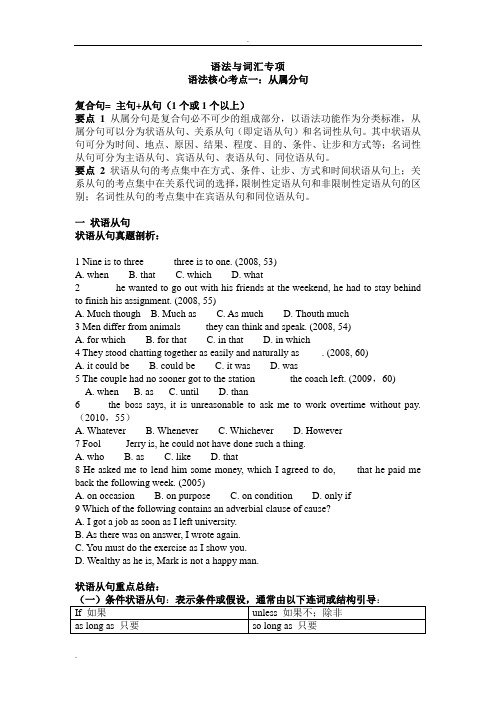
语法与词汇专项语法核心考点一:从属分句复合句= 主句+从句(1个或1个以上)要点1从属分句是复合句必不可少的组成部分,以语法功能作为分类标准,从属分句可以分为状语从句、关系从句(即定语从句)和名词性从句。
其中状语从句可分为时间、地点、原因、结果、程度、目的、条件、让步和方式等;名词性从句可分为主语从句、宾语从句、表语从句、同位语从句。
要点 2 状语从句的考点集中在方式、条件、让步、方式和时间状语从句上;关系从句的考点集中在关系代词的选择,限制性定语从句和非限制性定语从句的区别;名词性从句的考点集中在宾语从句和同位语从句。
一状语从句状语从句真题剖析:1 Nine is to three _____ three is to one. (2008, 53)A. whenB. thatC. whichD. what2 ______ he wanted to go out with his friends at the weekend, he had to stay behind to finish his assignment. (2008, 55)A. Much thoughB. Much asC. As muchD. Thouth much3 Men differ from animals ____ they can think and speak. (2008, 54)A. for whichB. for thatC. in thatD. in which4 They stood chatting together as easily and naturally as ____. (2008, 60)A. it could beB. could beC. it wasD. was5 The couple had no sooner got to the station ______ the coach left. (2009,60)A. whenB. asC. untilD. than6 ____ the boss says, it is unreasonable to ask me to work overtime without pay. (2010,55)A. WhateverB. WheneverC. WhicheverD. However7 Fool ____ Jerry is, he could not have done such a thing.A. whoB. asC. likeD. that8 He asked me to lend him some money, which I agreed to do, ___ that he paid me back the following week. (2005)A. on occasionB. on purposeC. on conditionD. only if9 Which of the following contains an adverbial clause of cause?A. I got a job as soon as I left university.B. As there was on answer, I wrote again.C. You must do the exercise as I show you.D. Wealthy as he is, Mark is not a happy man.状语从句重点总结:几种不常用的条件状语从句举例:In the event that she can not arrive on time, we will go first.Suppose it snowed, we would still go.Say what he said were true, what would you do about it?1. 几种不常用的让步状语从句举例:In spite of the fact that he was deaf and dumb, he had a genius for music.While the grandparents love the children, they are strict with them.Much as she needed the job, she had to refuse.For all that there were a lot of difficulties, he finally entered the final competition and won.Granted you have made much progress, you should not be conceited.2. 用了although或though,就一定不能再后面的从句中同时用but,但是though 可以和yet 连用。
专四语法重点总结
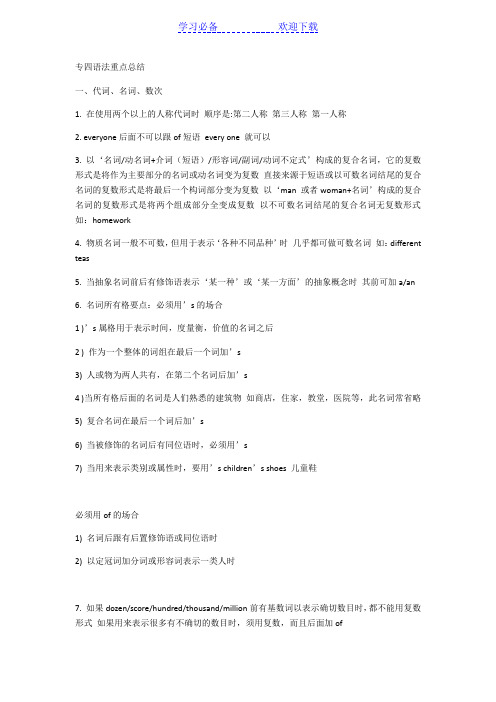
eg.
He is no richer than I= as poor as
He is not richer than I
4) more and more
eg. He is becoming fatter and fatter.
5). The more… the more…
Eg. He neither likes fiction nor (likes) poetry.
8) more than简直不
eg. My trip to Beijing is more than sightseeing.
六、并列结构
两个或两个以上意义相关、层次相同、句法功能也相同、并由并列连词或其他并列手段连接起来的语法结构序列叫做并列结构。
1.并列结构的各种形式
1)词与词的并列you and me
2) not only…but also连结成分和连接句子;只连对等结构
Eg. Not only I but also he will take part in the meeting.
Not only did he help me, but also he sent me home.
3) either…or连结成分和连接句子;连对等结构或不对等结构
单音节词尾e,加r, st fine finer finest
闭音节单音节词尾只有一个辅音字母,双写big bigger biggest
辅音字母加er,est
少数以y,er,ow, ble结尾
双音节词尾加er,est happy happier happiest(y前为辅音字母去y加clever cleverer cleverest
专四词汇整理大全

专四词汇整理大全对于英语专业的学生来说,通过专业四级考试(TEM4)是一项重要的任务。
而拥有丰富的词汇量是在这一考试中取得好成绩的关键之一。
以下是为大家精心整理的专四词汇大全,希望能对大家的学习有所帮助。
首先是常见的动词。
像“abandon”(遗弃;放弃)、“abolish”(废除;取消)、“absorb”(吸收;使全神贯注)等,这些动词在各种语境中都经常出现。
例如,“He abandoned his car in the desert”(他把车遗弃在了沙漠里。
)“The government abolished the unfair law”(政府废除了那条不公平的法律。
)“She was absorbed in her book”(她全神贯注于她的书。
)再来说说形容词。
“abnormal”(不正常的;反常的)、“absolute”(绝对的;完全的)、“abundant”(丰富的;充裕的)等形容词也十分重要。
比如,“His behavior is abnormal”(他的行为不正常。
)“It's an absolute truth”(这是一个绝对的真理。
)“We have an abundan t supplyof food”(我们有充裕的食物供应。
)接着是名词。
“absence”(缺席;不在)、“access”(通道;入口;接近)、“accommodation”(住处;膳宿)等名词也是需要重点掌握的。
举个例子,“His absence from the meeting was noticed”(他缺席会议被注意到了。
)“The only access to the village is by boat”(到那个村子的唯一通道是乘船。
)“We need better accommodation for the tourists”(我们需要为游客提供更好的膳宿。
)还有一些容易混淆的词汇。
最新英语专业四级核心词汇(整理版)

英语专业四级核心词汇1.alter v. 改变,改动,变更2.burst vi.,n. 突然发生,爆裂3.dispose vi. 除掉;处置;解决;处理(of)4.blast n. 爆炸;气流vi. 炸,炸掉5.consume v. 消耗,耗尽6.split v. 劈开;割裂;分裂a.裂开的7.spit v. 吐(唾液等);唾弃8.spill v. 溢出,溅出,倒出9.slip v. 滑动,滑落;忽略10.slide v. 滑动,滑落n. 滑动;滑面;幻灯片11.bacteria n. 细菌12.breed n. 种,品种v. 繁殖,产仔13.budget n. 预算v. 编预算,作安排14.candidate n. 候选人15.campus n. 校园16.liberal a. 慷慨的;丰富的;自由的17.transform v. 转变,变革;变换18.transmit v. 传播,播送;传递19.transplant v. 移植20.transport vt. 运输,运送n. 运输,运输工具21.shift v. 转移;转动;转变22.vary v. 变化,改变;使多样化23.vanish vi. 消灭,不见24.swallow v. 吞下,咽下n. 燕子25.suspicion n. 怀疑,疑心26.suspicious a. 怀疑的,可疑的d a. 温暖的,暖和的;温柔的,味淡的28.tender a. 温柔的;脆弱的29.nuisance n. 损害,妨害,讨厌(的人或事物)30.insignificant a. 无意义的,无足轻重的;无价值的31.accelerate vt. 加速,促进32.absolute a. 绝对的,无条件的;完全的33.boundary n. 分界线,边界34.brake n. 刹车,制动器v. 刹住(车)35.catalog n. 目录(册)v. 编目36.vague a. 模糊的,不明确的37.vain n. 徒劳,白费38.extinct a. 绝灭的,熄灭的39.extraordinary a. 不平常的,特别的,非凡的40.extreme a. 极度的,极端的n. 极端,过分41.agent n. 代理人,代理商;动因,原因42.alcohol n. 含酒精的饮料,酒精43.appeal n./vi. 呼吁,恳求44.appreciate vt. 重视,赏识,欣赏45.approve v. 赞成,同意,批准46.stimulate vt. 刺激,激励47.acquire vt. 取得,获得;学到48.accomplish vt .完成,到达;实行work n. 网状物;广播网,电视网;网络50.tide n. 潮汐;潮流51.tidy a. 整洁的,整齐的52.trace vt. 追踪,找到n. 痕迹,踪迹53.torture n./vt. 拷打,折磨54.wander vi. 漫游,闲逛55.wax n. 蜡56.weave v. 织,编57.preserve v. 保护,保存,保持,维持61. abuse v. 滥用,虐待;谩骂62. academic a. 学术的;高等院校的;研究院的64. battery n. 电池(组)65. barrier n. 障碍;棚栏66. cargo n. (船、飞机等装载的)货物67. career n. 生涯,职业68. vessel n. 船舶;容器,器皿;血管69. vertical a. 垂直的70. oblige v. 迫使,责成;使感激71. obscure a. 阴暗,模糊72. extent n. 程度,范围,大小,限度73. exterior n. 外部,外表a. 外部的,外表的74. external a. 外部的,外表的,外面的75. petrol n. 汽油76. petroleum n. 石油77. delay vt./n. 推迟,延误,耽搁78. decay vi. 腐烂,腐朽79. decent a. 像样的,体面的80. route n. 路;路线;航线81. ruin v. 毁坏,破坏n. 毁灭,[pl.]废墟82. sake n. 缘故,理由83. satellite n. 卫星84. scale n. 大小,规模;等级;刻85. temple n. 庙宇86. tedious a. 乏味道,单调的,87. tend vi.易于,趋向88. tendency n.趋向,趋势89. ultimate a. 极端的,最大的,最终的n. 极端90. undergo v. 经历,遭受91. abundant a. 丰富的,充裕的,大量的92. adopt v. 收养;采用;采纳93. adapt vi. 适应,适合;改编,改写vt. 使适应94. bachelor n. 学士,学士学位;单身汉95. casual a. 偶然的,碰巧的;临时的;非正式的96. trap n. 陷阱,圈套v. 设陷阱捕捉97. vacant a. 空的,未占用的98. vacuum n. 真空,真空吸尘器99. oral a. 口头的,口述的,口的100. optics n. (单、复数同形)光学词组汇总(一)___基础篇。
英语专业四级常考考点

英语专业四级常考考点集体名词作主语主谓一致1)通常作复数的集体名词集体名词,如:police, people,cattle,militia,poultry等,通常作复数,用复数动词。
如:Domestic cattle provide us with milk, beef and hides.2)通常作不可数名词的集体名词有些集体名词,如foliage,machinery,equipment,furniture,merchandise,通常作不可数名词,随后的动词用单数。
例如:All the machinery in the factory is made in China.3)既可作单数也可作复数的集体名词集体名词,如audience, committee, class, crew, family, public, government等,既可作单数,也可作复数用。
The city council is meeting to set its agenda.4)a committee,etc. of +复数名词如果主语是由“a committee of /a panel of /a board of +复数名词”构成,随后的动词通常用单数。
例如:A committee of five men and three women is to consider the matter.近义词辨析tired, exhausted, fatigued, weary, wornout这组词均含有“疲惫的”的意思。
tired可指因体力或脑力消耗太多而需要休息,还可指因长期做某事而失去兴趣。
Henry was so tired that he went to bed immediately after he got home.亨利很疲惫,一到家就上床睡觉去了。
exhausted表达的`疲惫程度最强,指因劳累过度而精疲力竭。
专四常考语法点汇总
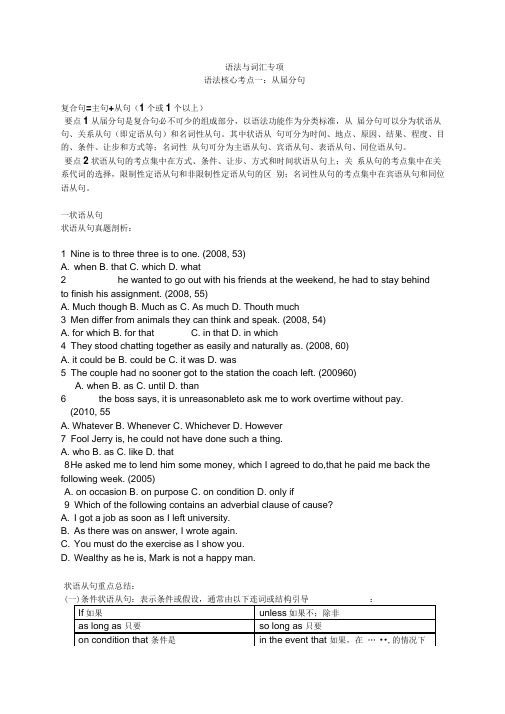
语法与词汇专项语法核心考点一:从届分句复合句=主句+从句(1个或1个以上)要点1从届分句是复合句必不可少的组成部分,以语法功能作为分类标准,从届分句可以分为状语从句、关系从句(即定语从句)和名词性从句。
其中状语从句可分为时间、地点、原因、结果、程度、目的、条件、让步和方式等;名词性从句可分为主语从句、宾语从句、表语从句、同位语从句。
要点2状语从句的考点集中在方式、条件、让步、方式和时间状语从句上;关系从句的考点集中在关系代词的选择,限制性定语从句和非限制性定语从句的区别;名词性从句的考点集中在宾语从句和同位语从句。
一状语从句状语从句真题剖析:1 Nine is to three three is to one. (2008, 53)A. whenB. thatC. whichD. what2 he wanted to go out with his friends at the weekend, he had to stay behindto finish his assignment. (2008, 55)A. Much thoughB. Much asC. As muchD. Thouth much3 Men differ from animals they can think and speak. (2008, 54)A. for whichB. for thatC. in thatD. in which4 They stood chatting together as easily and naturally as. (2008, 60)A. it could beB. could beC. it wasD. was5 The couple had no sooner got to the station the coach left. (200960)A. whenB. asC. untilD. than6 the boss says, it is unreasonableto ask me to work overtime without pay. (2010, 55A. WhateverB. WheneverC. WhicheverD. However7 Fool Jerry is, he could not have done such a thing.A. whoB. asC. likeD. that8 H e asked me to lend him some money, which I agreed to do,that he paid me back the following week. (2005)A. on occasionB. on purposeC. on conditionD. only if9 Which of the following contains an adverbial clause of cause?A. I got a job as soon as I left university.B. As there was on answer, I wrote again.C. You must do the exercise as I show you.D. Wealthy as he is, Mark is not a happy man.状语从句重点总结:(一)条件状语从句:表示条件或假设,通常由以下连词或结构引导:★特别提醒几种不常用的条件状语从句举例:In the event that she can not arrive on time, we will go first.Suppose it snowed, we would still go.Say what he said were true, what would you do about it?(二)让步状语从句:含有“虽然,尽管,即使”之意,主要引导词有:★特别提醒1. 几种不常用的让步状语从句举例:In spite of the fact that he was deaf and dumb, he had a genius for music.While the grandparents love the children, they are strict with them.Much as she needed the job, she had to refuse.For all that there were a lot of difficulties, he finally entered the final competition and won. Granted you have made much progress, you should not be conceited.2. 用了although或though,就一定不能再后面的从句中同时用but,但是though可以和yet连用。
英语知识点总结专四

英语知识点总结专四1. GrammarGrammar is an essential part of learning any language, including English. Some key topics in English grammar that are important for the PETS exam include:- Parts of speech: understanding the different parts of speech, such as nouns, verbs, adjectives, adverbs, and conjunctions, is crucial for constructing grammatically correct sentences.- Tenses: understanding the different tenses, including present, past, and future, as well as their various forms, is important for expressing actions and events accurately.- Sentence structure: knowing how to construct sentences using subject-verb-object order, as well as different types of sentence structures (e.g., simple, compound, and complex sentences), is important for effective communication in English.2. VocabularyA strong vocabulary is essential for understanding and expressing ideas in English. Some key areas of vocabulary that are important for the PETS exam include:- Word families: understanding the relationships between words, such as roots, prefixes, and suffixes, can help expand your vocabulary and understand new words more easily.- Word formation: knowing how to form new words from existing ones, such as through affixation or compounding, is important for expanding your vocabulary and understanding the meaning of unfamiliar words.- Collocations: learning common word combinations and phrases, or collocations, is important for using English more fluently and accurately.3. ReadingReading is an important skill for understanding written English and is a key component of the PETS exam. Some important reading skills for the PETS exam include:- Skimming and scanning: these are techniques for quickly locating specific information in a text, such as key words or phrases, without reading the entire text in detail.- Comprehension: understanding the main ideas, supporting details, and overall meaning of a text is important for answering comprehension questions and summarising the information.4. WritingWriting is an essential skill for expressing ideas and information in English. Some important writing skills for the PETS exam include:- Organisation: structuring your writing logically, with a clear introduction, body, and conclusion, is important for conveying your ideas effectively.- Coherence and cohesion: using appropriate linking words and transitional phrases to connect ideas and maintain the flow of your writing is crucial for producing well-structured and cohesive texts.5. ListeningListening is a key skill for understanding spoken English and is an important part of the PETS exam. Some important listening skills for the PETS exam include:- Understanding main ideas: identifying the main topic, key points, and supporting details in spoken texts is important for answering comprehension questions and summarising the information.- Note-taking: taking effective notes while listening to spoken texts, such as lectures or conversations, can help you remember and understand the information more easily.6. SpeakingSpeaking is an essential skill for communicating in English and is a key component of the PETS exam. Some important speaking skills for the PETS exam include:- Fluency and coherence: speaking confidently and smoothly, with a clear flow of ideas and appropriate linking words, is important for expressing yourself effectively.- Pronunciation and intonation: speaking clearly and correctly, with accurate pronunciation and appropriate intonation, is crucial for being understood and communicating fluently in English.In conclusion, there are many important knowledge points to consider when learning English for the PETS exam. These points cover a range of areas, including grammar, vocabulary, reading, writing, listening, and speaking. By mastering these key knowledge points, you can improve your English language skills and prepare effectively for the PETS exam. Good luck with your studies, and we wish you success in your English language learning journey!。
专四常考语法点汇总
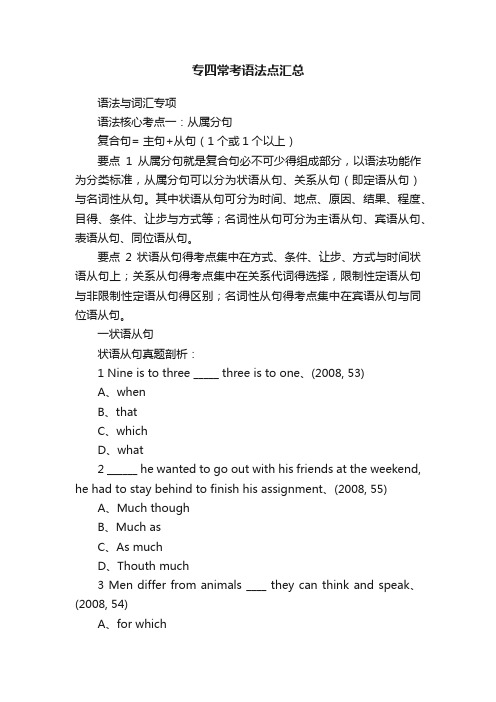
专四常考语法点汇总语法与词汇专项语法核心考点一:从属分句复合句= 主句+从句(1个或1个以上)要点1从属分句就是复合句必不可少得组成部分,以语法功能作为分类标准,从属分句可以分为状语从句、关系从句(即定语从句)与名词性从句。
其中状语从句可分为时间、地点、原因、结果、程度、目得、条件、让步与方式等;名词性从句可分为主语从句、宾语从句、表语从句、同位语从句。
要点2 状语从句得考点集中在方式、条件、让步、方式与时间状语从句上;关系从句得考点集中在关系代词得选择,限制性定语从句与非限制性定语从句得区别;名词性从句得考点集中在宾语从句与同位语从句。
一状语从句状语从句真题剖析:1 Nine is to three _____ three is to one、(2008, 53)A、whenB、thatC、whichD、what2 ______ he wanted to go out with his friends at the weekend, he had to stay behind to finish his assignment、(2008, 55)A、Much thoughB、Much asC、As muchD、Thouth much3 Men differ from animals ____ they can think and speak、(2008, 54)A、for whichB、for thatC、in thatD、in which4 They stood chatting together as easily and naturally as ____、(2008, 60)A、it could beB、could beC、it wasD、was5 The couple had no sooner got to the station ______ the coach left、(2009,60)A、whenB、asC、untilD、than6 ____ the boss says, it is unreasonable to ask me to work overtime without pay、(2010,55)A、WhateverB、WheneverC、WhicheverD、However7 Fool ____ Jerry is, he could not have done such a thing、A、whoB、asC、likeD、that8 He asked me to lend him some money, which I agreed to do, ___ that he paid me back the following week、(2005)A、on occasionB、on purposeC、on conditionD、only if9 Which of the following contains an adverbial clause of cause?A、I got a job as soon as I left university、B、As there was on answer, I wrote again、C、You must do the exercise as I show you、D、Wealthy as he is, Mark is not a happy man、状语从句重点总结:几种不常用得条件状语从句举例:In the event that she can not arrive on time, we will go first、Suppose it snowed, we would still go、Say what he said were true, what would you do about it?1、几种不常用得让步状语从句举例:In spite of the fact that he was deaf and dumb, he had a genius for music、While the grandparents love the children, they are strict with them、Much as she needed the job, she had to refuse、For all that there were a lot of difficulties, he finally entered the final competition and won、Granted you have made much progress, you should not be conceited、2、用了although或though,就一定不能再后面得从句中同时用but,但就是though 可以与yet 连用。
英语专业四级语法复习要点

英语专业四级语法复习要点一、名词名词是英语八大词类之一,用来表示人、动物、事物、地点等具体或抽象的事物。
名词有可数名词和不可数名词之分。
1. 可数名词可数名词可以用一个数词或代数词表示单数或复数。
需要注意以下几个要点:- 单数名词通常可以在前面加上不定冠词"a"或"an"表示单数,例如:a book(一本书)。
- 复数名词通常可以在前面加上不定冠词"some"或"any"表示复数,例如:some books(一些书)。
- 有些名词的复数形式与单数形式相同,例如:deer(鹿)和sheep (羊)。
- 有些名词的复数形式要加上"-s",例如:books(书)和cats(猫)。
- 有些名词的复数形式要加上"-es",例如:watches(手表)和boxes(盒子)。
2. 不可数名词不可数名词通常表示抽象概念、物质、液体等无法具体计数的事物。
以下是一些常见的不可数名词:- information(信息)- water(水)- milk(牛奶)- money(钱)- knowledge(知识)- advice(建议)- weather(天气)二、代词代词用来代替名词,起到替代作用。
根据具体使用情况,代词可分为不同类型。
1. 人称代词人称代词用来代替人或事物的人称,分为主格和宾格两种形式:- 主格:I(我)、you(你/您)、he(他)、she(她)、it(它)、we(我们)、they(他们/她们/它们)- 宾格:me(我)、you(你/您)、him(他)、her(她)、it (它)、us(我们)、them(他们/她们/它们)2. 物主代词物主代词用来表示所属关系,分为形容词性和名词性两种类型:- 形容词性物主代词:my(我的)、your(你/您的)、his(他的)、her(她的)、its(它的)、our(我们的)、their(他们/她们/它们的)- 名词性物主代词:mine(我的)、yours(你/您的)、his(他的)、hers(她的)、its(它的)、ours(我们的)、theirs(他们/她们/它们的)3. 相互代词相互代词用来表示彼此关系,常用的相互代词有:- each other(彼此之间)- one another(彼此之间)三、动词动词是句子的核心,并用于表示行为、状态、存在等。
专四重点词汇讲解

专四重点词汇讲解1. “Abandon”这个词可太重要啦!比如:He had to abandon the car in the middle of the road. 你看,就是这样简单直接,就是“放弃”“抛弃”的意思嘛。
当你面对一件超级困难的事情,没办法啦,是不是就得 abandon 呀?2. “Appeal”,哎呀,就是“呼吁”“吸引力”的意思嘛!She made an appeal for people to donate blood. 就像我们呼吁大家献爱心一样呀,这不就很好理解嘛!3. “Accommodate”,哇哦,这个词是“容纳”“适应”的意思哟!The hotel can accommodate up to 500 guests. 是不是很形象,酒店能容纳那么多人呢!你想想你去住酒店是不是就得找能 accommodate 你的呀!4. “Aggravate”,意思就是“使恶化”“激怒”。
His rudeness aggravated the situation. 这就好比本来就不太好的情况,他这么一弄,更糟糕啦,是不是特别容易理解呀!5. “Benefit”,谁不知道是“好处”“益处”呀!Taking exercise regularly brings many benefits. 咱都知道锻炼有好多好处呀,这个词就这么简单!6. “Consistent”,是“一致的”“连贯的”意思呢。
Her attitude is consistent throughout. 就像她的态度始终如一,这解释多明了!7. “Distinguish”,就是“区分”“辨别”的意思呀!Can you distinguish the differences between them? 是不是经常需要去区分很多东西呀!8. “Exceptional”,表示“非凡的”“异常的”。
He is an exceptional student. 哇,就是那种特别厉害、与众不同的学生呀!总之,这些专四重点词汇真的很重要呀,大家一定要好好掌握呀!。
- 1、下载文档前请自行甄别文档内容的完整性,平台不提供额外的编辑、内容补充、找答案等附加服务。
- 2、"仅部分预览"的文档,不可在线预览部分如存在完整性等问题,可反馈申请退款(可完整预览的文档不适用该条件!)。
- 3、如文档侵犯您的权益,请联系客服反馈,我们会尽快为您处理(人工客服工作时间:9:00-18:30)。
英语专四重点整理一、语法部分考查重点1、虚拟语气的考点为:would rather+that从句+一般过去时;It is vital/necessary/important/urgent/imperative/desirable/advisable/natural/essential+that+(should)动词原形;proposal/suggestion+that+动词原形;It is time/about time/high time+that+一般过去时;lest+that+should+动词原形;if only+that+would+动词原形。
2、状语从句的考点为:非if引导的条件状语从句,此类句子多用at times,provided,so long as,in case,once等来替代if;由even if/so,now that,for all等引导的让步状语从句;just/hardly...when引导的时间状语从句;more than,as...as,not so much as,the same as,as much as等引导的比较状语从句。
3、独立主格结构多以逻辑主语+分词的形式出现。
4、情态动词多与完成时形式连用。
5、定语从句重点考查介词+关系代词(which)和as作为关系代词。
二、词汇部分考查重点1、动词、名词与介词的搭配如:popular/patient+with;yield/solution/adapt /transfer/access+to;accuse/require+of;charge+for;under+discussion等等。
2、习惯用法如:confess to/set about/be used to+doing;be supposed to/have /make sb.+do等。
3、由同一动词构成的短语如:come,go,set,break等构成的短语。
4、单个的动词,抽象名词,形容词和副词多以近义词、同义词的形式出现。
5、介词短语在句中作状语如:in terms of;with the exception of;in vain等,另外还应注意rather than,other than,such as,none/nothing+but等词在考题中的出现。
三、专四重要词组1.abide by(=be faithful to ; obey)忠于;遵守。
2. be absent from…. 缺席,不在3. absence of mind(=being absent-minded) 心不在焉4. absorb(=take up the attention of)吸引…的注意力(被动语态)be absorbed i n 全神贯注于…近be engrossed in ; be lost in ; be rapt in ;be concentrated on ; be focused on ; be centered on5. (be) abundant in(be rich in; be well supplied with) 富于,富有6. access(to) (不可数名词) 能接近,进入,了解7. by accident(=by chance, accidentally)偶然地,意外. Without accident(=safely) 安全地,8. of one’s own accord(=without being asked; willingly; freely)自愿地,主动地9. in accord with 与…一致. out of one’s accord with 同….不一致10. with one accord (=with everybody agreeing)一致地11. in accordance with (=in agreement with) 依照,根据12. on one’s own account 1) 为了某人的缘故, 为了某人自己的利益2) (=at one’s own risk) 自行负责3) (=by oneself)依靠自己on account 赊账; on account of 因为; on no account不论什么原因也不;of …account 有…..重要性.13. take…into account(=consider)把...考虑进去14. give sb. an account of 说明, 解释(理由)15. account for (=give an explanation or reason for) 解释, 说明.16. on account of (=because of) 由于,因为.17. on no account(=in no case, for no reason)绝不要,无论如何不要(放句首时句子要倒装)18. accuse…of…(=charge…with; blame sb. for sth. ; blame sth. on sb. ; complain about) 指控,控告19. be accustomed to (=be in the habit of, be used to)习惯于.20. be acquainted with(=to have knowledge of) 了解; (=to have met socially ) 熟悉21. act on 奉行,按照…行动; act as 扮演; act for 代理22. adapt oneself to(=adjust oneself to) 使自己适应于23. adapt…(for) (=make sth. Suitable for a new need) 改编, 改写(以适应新的需要)24. in addition (=besides) 此外, 又, 加之25. in addition to(=as well as, besides, other than)除…外26. adhere to (=abide by, conform to, comply with, cling to, insist on, pe rsist in, observe, opinion, belief ) 粘附; 坚持, 遵循27. adjacent(=next to, close to) 毗邻的, 临近的28. adjust..(to) (=change slightly)调节; 适应;29. admit of (=be capable of, leave room for) …的可能,留有…的余地.30. in advance (before in time) 预告, 事先.31. to advantage 有利的,使优点更加突出地.32. have an advantage over 胜过. have the advantage of 由于…处于有利条件have the advantage of sb.知道某人所不知道的事33. take advantage of (=make the best of, utilize, make use of, profit from, harness)利用.34. agree with 赞同(某人意见) agree to 同意35. in agreement (with) 同意, 一致36. ahead of 在…之前, 超过…;……………. ahead o f time 提前.37. in the air 1)不肯定, 不具体. 2)在谣传中.38. above all (=especially, most important of all) 尤其是, 最重要的.39. in all (=counting everyone or everything, altogether) 总共, 总计40. after all 毕竟,到底; (not) at all 一点也不; all at once(=suddenly)突然; once and for all 只此一次; above all 最重要的; first of all 首先; all in all 大体上说; be all in 累极了; all but 几乎.41. allow for (=take into consideration, take into account) 考虑到, 估计到.42. amount to (=to be equal to) 总计, 等于.43. answer for (undertake responsibility for, be liable for, take charge for) 对…负责.44. answer to (=conform to) 适合,符合.45. be anxious about 为…焦急不安; 或anxious for46. apologize to sb. for sth. 为…向…道歉47. appeal to sb. for sth. 为某事向某人呼吁. appeal to sb. 对某人有吸引力48. apply to sb. for sth. 为…向…申请; apply for申请; apply to 适用.49. apply to 与…有关;适用50. approve of (=consent to, be in favor of, favor, agree to, consider good, right) 赞成, approve vt. 批准51. arise from(=be caused by) 由…引起.52. arrange for sb.sth. to do sth. 安排…做…53. arrive on 到达; arrive at 到达某地(小地方);得出,作出; arrive in 到达某地(大地方);54. be ashamed of (=feel shame, guilt or sorrow because of sth. done) 以… 为羞耻55. assure sb. of sth. (=try to cause to believe or trust in sth.) 向…保证, 使…确信.56. attach(to) (=to fix, fasten; join) 缚, 系,结57. make an attempt at doing sth. (to do sth.) 试图做…58. attend to (=give one’s attention, care and thought)注意,照顾;attend on(upon)(=wait upon, serve, look after) 侍候,照料59. attitude to toward …对…的态度.看法60. attribute…to…(=to believe sth. to be the result of…)把..归因于.., 认为..是..的结61. on the average (=on average, on an average) 平均62. (be) aware of (=be conscious of , having knowledge or consciousness)意识到,知道.63. at the back of (=behind) 在…后面64. in the back of 在…后部(里面); on the back of 在…后部(外面); be on one’s back(=be ill in bed) 卧病不起.65. at one’s back(=supporting or favoring sb.) 支持,维护; have sb. at one ’s back 有…支持, 有…作后台66. turn one’s back on sb. (=turn away from sb. in an impolite way) 不理睬(某人),背弃,抛弃67. behind one’s back 背着某人(说坏话)68. be based on upon 基于69. on the basis of 根据…, 在…基础上70. beat…at 在…运动项目上打赢71. begin with 以…开始. to begin with (=first of all) 首先, 第一(经常用于开始语)72. on behalf of (=as the representative of) 以…名义73. believe in(=have faith or trust in; consider sth.sb. to be true) 相信,依赖,信仰.74. benefit (from) 受益,得到好处.75. for the benefit of 为了…的利益(好处)76. for the better 好转77. get the better of (=defeat sb.) 打败, 胜过.78. by birth 在出生上,论出身,按血统at birth 在出生时; give birth to 出生79. blame sb. for sth. 因…责备某人. blame sth. on sb. 把…推在某人身上80. in blossom开花(指树木) be in blossom开花(强调状态) come into blossom开花(强调动作)81. on board 到船上, 在船上, 上火车或飞机82. boast of (or about) 吹嘘83. out of breath 喘不过气来84. in brief(=in as few words as possible)简言之85. in bulk 成批地,不散装的86. take the floor 起立发言87. on business 出差办事.88. be busy with sth.于某事。
